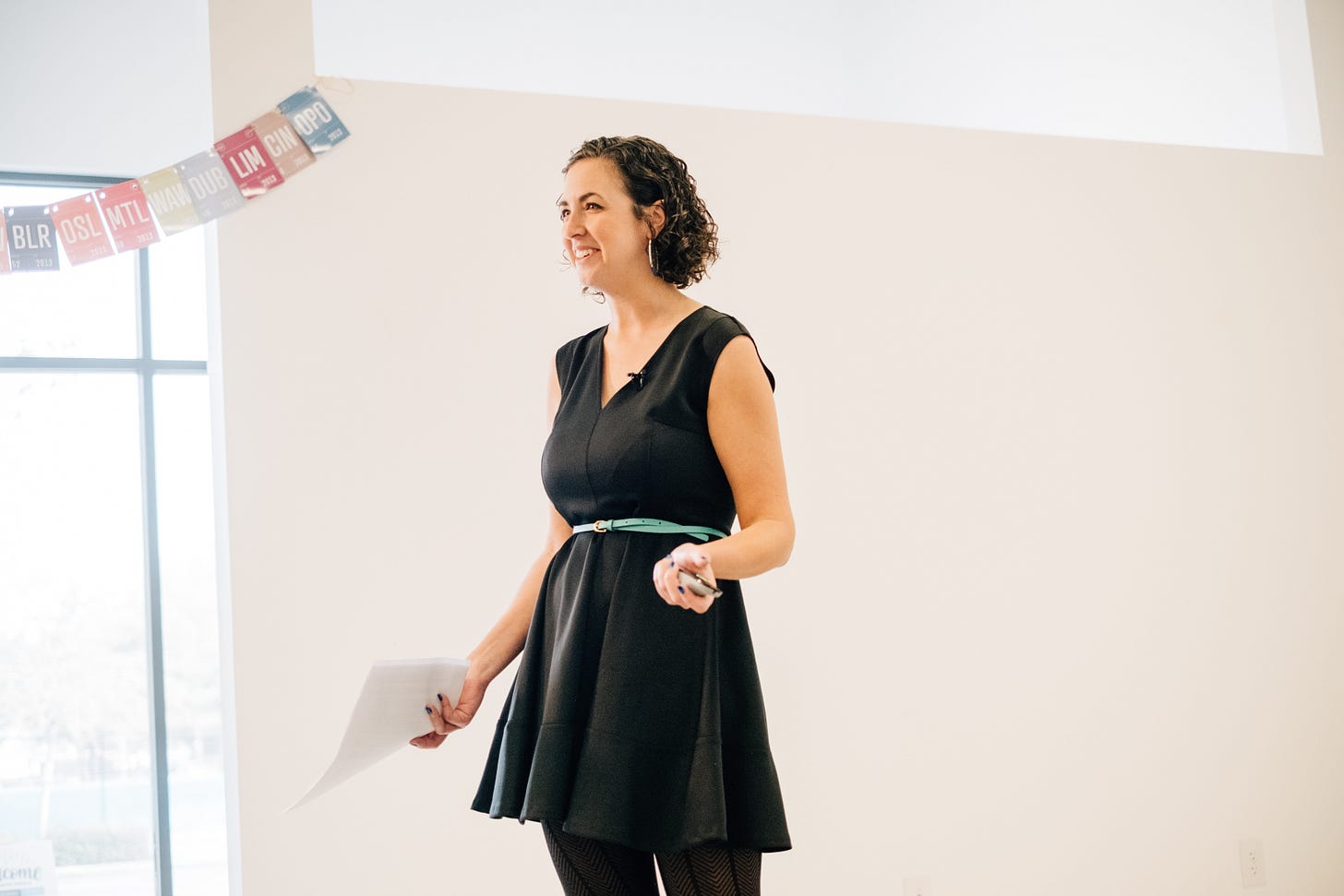Earlier this year, I got on a stage and spoke about anxiety.
I reflected on what it was like to lose my husband, Jamie, and what grief had taught me about managing my anxious thoughts. I shared anecdotes from hard-fought battles with panic attacks and tried-and-true tips on how to calm my overactive mind. The talk was filmed, the transcript was published, and still, months later, I hear from people who said my advice helped them.
I conquered anxiety and helped other people! That’s awesome, right?
Except, I didn’t actually conquer anxiety. While my advice may have helped others, I regularly forget to follow it. I identified things that helped me manage my emotions, yes, but remembering those tips—especially while navigating the ups and downs of grief—has been surprisingly hard.
Although I began 2018 by talking about my anxiety in front of a crowd, I’ve spent a lot of time since then feeling anxious, wanting to hide in the shadows. Who am I to give advice?
I recently revisited my speech, wondering if it’s just empty talk. If I’m being honest with myself, I think the advice I gave is actually pretty good. Whenever I do follow my own wisdom, I feel a lot better. But for whatever reason, I continue to slip up. I revert to my old anxiety-inducing habits and thought patterns. My brain, however well intentioned, doesn’t seem to get it.
Jamie was a smart guy. He went to college on a full academic scholarship. He had an encyclopedic knowledge of movies and art history. He could carry a conversation with seemingly anyone, no matter the subject. He taught himself how to cook like an acclaimed chef and build furniture like a fairly impressive Boy Scout. He was one of the funniest people I knew.
Despite all of this, Jamie would sometimes get frustrated with his inability to adopt healthy mindsets or behaviors—to remember the things he intrinsically knew. And whenever he’d get upset about these things, he’d complain about his “dumb brain.”
I soon picked up Jamie’s habit, and would commiserate whenever my dumb brain was also struggling with something—which, let’s be honest, was and is often. But unlike Jamie, who talked about his sometimes-disappointing mind in a joking and loving way, I was simply mean to myself. My brain, i.e. me, wasn’t good enough.
After Jamie died, my brain got really dumb. I would question whether he was really dead. I would cycle through the same hopeless thoughts. I would walk zombie-like from room to room in my house, unable to remember what I was looking for. I would desperately cling to the past or panic about the future, and never actually spend any time in the present.
Everything I was going through was a completely normal (and necessary) reaction to grief. My 32-year-old husband dropped dead in the middle of a half marathon! It’s no wonder I was having trouble processing it all. As I started to make sense of the immense grief I now carried, I discovered that being unkind to myself and my brain during only made an impossibly hard time even harder.
So, I became gentler. I started referring to my “sweet dumb brain.” It was a small change, but a meaningful one. Accepting my sweet dumb brain made talking about the things I was experiencing a little easier. It helped me feel more in control when most everything was out of control. After all, I was doing the best I could, with my sweet and mostly good brain—that also happened to be a little dumb sometimes.
I’ve done a lot of healing since those early grief days. I no longer walk zombie-like around my house. Thought spirals still happen, but a lot less frequently and with less intensity. My struggles are familiar issues that I’ve faced for years, like anxiety and depression. Sometimes I get frustrated with my ability to focus and be productive. Other times, my confidence is completely shot. And sometimes, I have a really good, positive, forward-thinking day or two.
For better or worse, there always seem to be plenty of issues that keep my sweet dumb brain occupied. The other lesson I learned early on in grief is that writing and sharing openly about what I’m going through helps me—and others.
So here we are. My Sweet Dumb Brain is a weekly newsletter featuring essays about relatable brain struggles. I’ll be writing the essays and my amazing friend Rebecca Coates (who’s the sweetest and the smartest) will be editing. I’m not entirely sure how this will all take shape, but I’m excited to watch it happen.
I started this newsletter as a way to remind myself that I do have good advice and valuable experiences to share, even if I’m not always the best at listening to myself. Hopefully we can listen and learn together.
xoxo
KHG
Good job, brain
I'm reading: Sharp: The Women Who Made an Art of Having an Opinion
I'm inspired by: Mari Andrew's Instagram (how are all of her posts so relatable?!)
I'm aiming to: Make this newsletter fun, not stressful for me.
What have you struggled with?
I am a huge fan of crowdsourcing and sharing wisdom, and I'd love to do both of those things through My Sweet Dumb Brain. We all have times when our minds feel like a frustrating place, and we've all figured out various tools for facing those times. What's helped you?
Respond to this email (or slide into my DMs on Instagram or Twitter) and let me know! I'll share some of your replies in future issues.
My Sweet Dumb Brain is written by Katie Hawkins-Gaar. It’s edited by Rebecca Coates. Photo courtesy CreativeMornings/SP.



